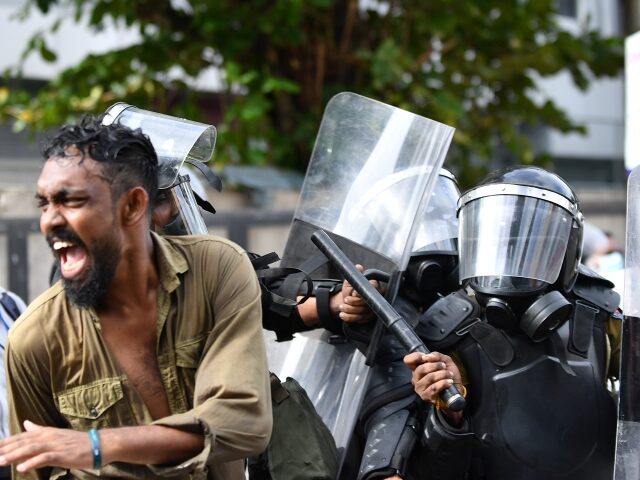The socialist government of Sri Lankan President Ranil Wickremesinghe charged student protesters on Monday with violating the “Prevention of Terrorism Act” by holding a peaceful march, the latest in a string of actions supporters of the nation’s anti-government protest movement say are a “witch hunt” against legitimate complaints against corruption and incompetence.
The Democratic Socialist Republic of Sri Lanka began experiencing widespread protests in March demanding that then-President Gotabaya Rajapaksa and his family members in top government positions resign. The nation began experiencing near-total shortages that month of basic food, medicine, and fuel goods as well as routine power outages that made basic life activities like work and school nearly impossible.
Rajapaksa ultimately fled the country and, under Wickremesinghe, Sri Lankan police have been far less tolerant of protests in the country, which have been overwhelmingly peaceful since beginning in March with the exception of mobs burning down the homes of politicians, including Wickremesinghe’s. The arrests announced Monday reportedly occurred on August 18.
Sri Lanka’s Inter-University Students’ Federation (IUSF) organized a protest against the government over many of the same issues that prompted the initial protest movement: critical food and fuel shortages, high cost of living, and a lack of interest on the part of the federal government to improve the lives of citizens. Police reportedly arrested about 20 people but retained only three people on charges of terrorism. The individuals charged are reportedly the convener of the IUSF Wasantha Mudalige and two other student activists, Hashan Jeewantha and Galwewa Siridhamma.
The Sri Lankan Defense Ministry confirmed on Monday that the three men will face 90 days in detention for “questioning.”
The IUSF organized a legal protest, its attorneys say, and did not receive any preemptive notice that police would object to the assembly, which would be required to deem it illegal. No reports indicate any violence occurred at the August 18 protest. Footage of the march from that day also does not show any overtly threatening or illegal activity.
Wickremesinghe became president in July after being “elected” with 134 votes in Parliament. He had previously served as prime minister six times. The day after his inauguration, the president ordered the military to violently displace a protest camp in the capital dubbed “Occupy Galle Face,” the name of the grassy area where it was located. He has focused much of his attention as president on eradicating the protest movement, which has come to be known as the Aragalaya, or “struggle,” much to the dismay of Sri Lankans who widely supported the removal of all establishment politicians and installation of competent replacements.
“Not only has the new President failed to provide a degree of accountability, but he is also indulging in a vicious witch-hunt against the activists who stood up against that corrupt and nepotistic regime,” columnist Ranga Jayasuriya of Sri Lanka’s Daily Mirror lamented in the newspaper’s cover story on Tuesday.
“That peaceful revolution is in retreat now. Its activists are hounded. A culture of intimidation has taken hold of the country. The old guard has returned to power through proxy,” Jayasuriya denounced, observing how many members of the Rajapaksas’ Sri Lanka Podujana Peramuna (SLPP) are supporting Wickremesinghe and may soon find their way into the presidential cabinet. “For a government that is devoid of any semblance of legitimacy, repression has become a tempting option to keep the nation under check.”
“If there is an accidental winner in this sad outcome, it is President Ranil Wickremesinghe, who would not have been where he is now without the Aragalaya. Yet he has labeled the protestors as ‘fascists’ and ‘terrorists’ and unleashed a vindictive witch-hunt,” Jayasuriya continued, accusing Wickremesinghe of being “more answerable to the Rajapaksas than they are to the Sri Lankan public” and turning the protest movement into “a regression of democracy.”
“Activists are hounded under charges as ludicrous as being the first to step into the president’s house, eating from the president’s kitchen and sleeping in the president’s bed,” the columnist observed. “In the meanwhile, large-scale scammers and wheeler-dealers are having a field day. Some have already made it to the Cabinet.”
Jayasuriya accused Wickremesinghe of having a “grudge” against the protest movement generally for having burned down his home and attempting to exact revenge on the general population.
The Daily Mirror is not alone in condemning Wickremesinghe. The Colombo Telegraph, which often publishes anti-government opinions regardless of who is running the government, published a column on Tuesday declaring Wickremesinghe and the Rajapaksa family the “axis of evil.”
“Each and every time he [Wickremesinghe] was in power with enormous opportunity and power to justify his stay in power and bring along prudent resolutions to complicated and complex issues, he failed,” the author, Vishwamithra, said of the president. “Ranil’s failures are many and varied. But what has taken him down time and time again is his stubborn refusal to accept the obvious.”
Vishwamithra concluded with a personal attack on Wickremesinghe’s comfortable upbringing as part of the Sri Lankan political elite: “Having remained his mother’s boy, Ranil’s comfort zone has always been in a corner away from the people who matter in the enterprise he has chosen to be engaged in.”
Under Gotabaya Rajapaksa and his family – his brother, former president and prime minister Mahinda Rajapaksa; former minister of finance Basil Rajapaksa; and, at one point, as many as 40 other Rajapaksa family members in cabinet and other government roles – the Sri Lankan government outrageously misspent its money on predatory loans from China, lavish expenses for the elite, and failed government programs. Gotabaya Rajapaksa also outlawed chemical fertilizers, making Sri Lanka reliant on food imports to survive. The expenses meant that Sri Lanka ran out of foreign currency reserves and thus could not purchase any food, starving the population.
By July, every Rajapaksa except for Gotabaya had resigned. Mahinda Rajapaksa resigned from the prime ministership after a mob burned down his home. Rajapaksa finally fled the country in mid-July after a mob took over his official residence, throwing a house party for five days in which hundreds of Sri Lankans toured the facilities, ate Rajapaksa’s food, drank his alcohol, and showered in his bathroom.
The Aragalaya movement that resulted in Rajapaksa’s ouster attempted to continue following Rajapaksa’s departure and the installation of six-time prime minister Ranil Wickremesinghe as the nation’s president. Wickremesinghe “won” the presidency with 134 votes in the parliament; protesters called for his resignation on the day of his inauguration as president. Like Mahinda Rajapaksa, protesters burned down Wickremesinghe’s private home in July.
Basil Rajapaksa does not hold any government position but currently serves as national organizer of the SLPP, making him an indispensable political power broker for Wickremesinghe.
Wickremesinghe has stated that he will not allow a presidential election with a popular vote in the “immediate future,” the Daily Mirror reported this week.
Follow Frances Martel on Facebook and Twitter.



COMMENTS
Please let us know if you're having issues with commenting.